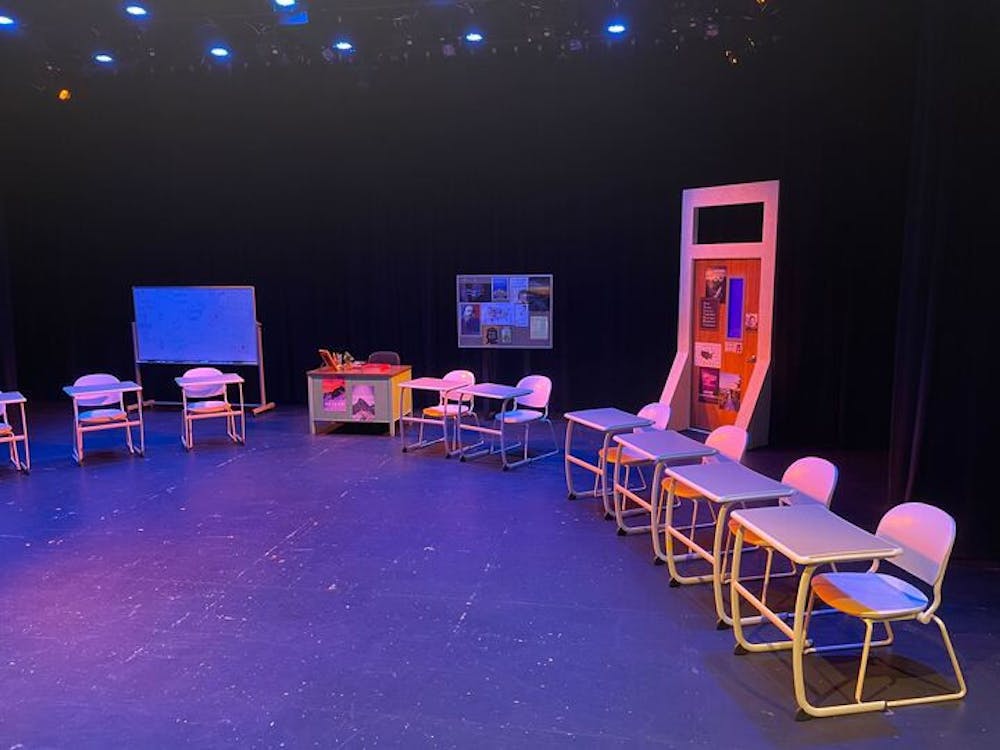“John Proctor is the Villain” is more than the name of Elon University’s 2023 fall play, it’s a declaration. It’s a critique of pop culture, the patriarchy and “The Crucible.”
With six shows Oct. 6 to Oct. 10, the cast and crew of Elon students worked together to tell the story of students in rural Georgia learning to stand up for themselves — and each other — as their community is impacted by the rise of the #MeToo movement.
Doors were slammed, a desk was thrown, Taylor Swift’s “Dear John” was sung and Lorde’s “Green Light” was a recurring plot point.
Senior Sarah Cadol played Beth, an enthusiastic student and president of the school’s brand new feminist club.
“She's bringing people together for a common good and she's fighting against a lot of pushback from her community,” Cadol said.
Senior Matthew Bobzien worked as the production’s dramaturg — researching the context,history and references of the play to help connect the company and audience to the world of the play.
The show follows a high school literature class reading and discussing “The Crucible,” a 1953 play by Arthur Miller set in the Salem witch trials. Mr. Carter Smith, their teacher, tells the class that John Proctor is the story’s hero.
“He's usually revered as a hero, but really with his behavior and treatment of Abigail, if we think about it in a contemporary context, he was a bad dude. He did terrible things,” Bobzien said in a previous interview with Elon News Network. “So they interrogate the play while also being in conversation with what is happening in their community.”
Smith, played by senior Alex Carnot, sings Proctor’s praises throughout the show, even calling him “one of the best characters ever.”
While explaining “The Crucible,” Smith says the play was written as an allegory for what was happening around the playwright. While “The Crucible” might have paralleled Miller’s life, the students in his class begin to notice parallels between their own community and the plot of the play.
“That’s what art is for. That’s what literature is for, to make sense of moments in time like this one,” Carnot said in the play.
“John Proctor is the Villain” is set in 2019, during the peak of the #MeToo movement. Beyond “The Crucible” itself, the students question popular interpretations of the play and ask themselves, “What makes someone a hero?”
Even before the opening line, the audience was introduced to the story. The lobby of Scott Studios was covered in character mood boards, curated playlists and audience-added sticky notes responding to various prompts. The lobby decorations were a result of Bobzien’s research and aim to connect the audience with the story.
Red posters reading “What does feminism mean to you?” and “Describe high school in 3 words” were taped on the walls alongside other prompts and covered with different colored Post-Its. A pink note with neat handwriting that read “finding people who believe me” was one of several sticky notes stuck to a poster asking “How have you found your voice?”
The students in the play find their voices through creating the school’s first feminist club, learning how to be honest with each other and speaking up about what was happening in their community.
Cadol said she hopes that the audience saw “John Proctor is the Villain” as a call to action, rather than just a play.
“I want them to feel empowered to stand up for what they believe in and to cultivate community around issues that they're passionate about,” Cadol said.
Senior Cara Johnson played Ms. Bailey Gallagher, the school counselor. In the show, Gallagher helps the students navigate the changes their community is facing.
“It's really nice to be able to see young people, even if they are characters that have been written, fight for change that's going to help them and not just fall in directly to the lanes that were placed there for them because those end up being harmful sometimes,” Johnson said in a previous interview with Elon News Network.
Johnson said they hope the audience understood the importance of listening to young voices, something they said more people should do.
“Their points are just as valid and can and should be used to make changes that are going to better the environment for everybody involved,” Johnson said.
Senior Jessica Werfel attended the closing night show and said that despite the play being set in 2019, the topics and themes are still incredibly relevant in 2023.
“I took away a lot of different things from the show,” Werfel said. “I feel like I really saw the power of communication – with high schoolers especially – with topics that are more sensitive.”
Werfel attended the show with junior Grace Minton who said she appreciated how the play showed a variety of perspectives regarding the sexual assault allegations in their community – which included those who feel confused and betrayed, those who find the strength to speak up, those who feel guilty for not believing earlier and those who begin to realize they aren’t alone.
While there are no remaining showings of the fall play, the Elon performing arts’ fall musical will have six showings from Oct. 27 to Nov. 4 at McCrary Theatre. Tickets for “Spring Awakening,” a rock musical about students discovering their sexuality, are available online and are $15 or free with an Elon ID.


